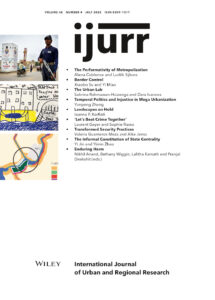In the field of city-governance urban labs are being constructed as experimental spaces of knowledge production, innovation and urban governance. This perspective is mirrored in the majority of the literature engaging with the urban lab. However, empirical evidence shows that ‘urban labs’ are also constituted through imaginative work practices that remain unexplored in theory and practice. In order to address this gap and to delineate how these spaces matter for urban governance, this article critically examines urban lab projects in the city of Rotterdam, the Netherlands. We approach the initiatives under study from the perspective of the urban imaginary, which is shaped through three types of imaginative work—branding, dreaming and assimilating. These imaginative practices reveal how the process of constructing and practising the urban lab has political implications for the city. This point is important, as it brings up questions about urban governance and participation, such as who has access to, and who is allowed to imagine and experiment in, the city? In this way we connect the literature on urban imaginaries to debates on participation and experimental urban governance in the urban lab.
Details
Written by:
Sabrina Rahmawan-Huizenga & Dara Ivanova
Digital Object Identifier (DOI)
10.1111/1468-2427.13123
About DOI

